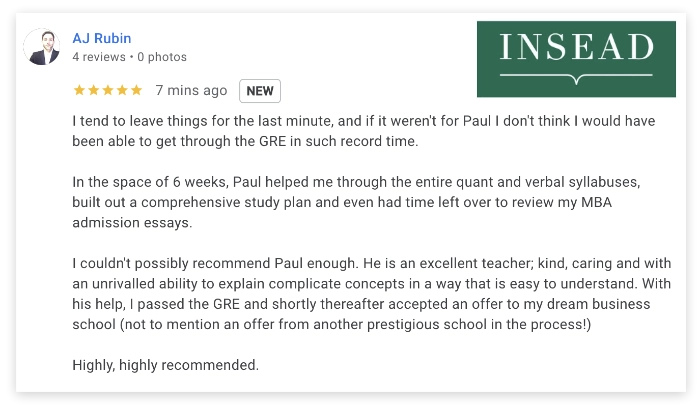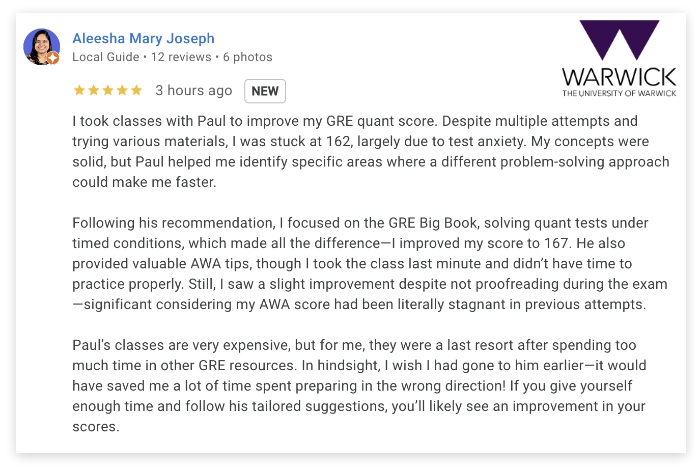Harvard GRE Tutor With 24 Years’ Experience
I’ll teach you GRE strategies that AI can’t replicate.








I’m the only GRE tutor in London with nearly 100 5-star reviews!
More reviews and business school outcomes


Book your FREE strategy call
GMAT or GRE?
Hi, my name is Paul and I’m a professional GRE tutor. I’ve been teaching the GRE since 2013 and standardised tests since 2002, and I’ve helped hundreds of students achieve their graduate school dreams.
I know the GRE may be standing in your way, but studying for it doesn’t have to be a daunting or intimidating process. In fact, many of my students find our sessions fun and inspiring.
If you’re considering the GRE and have any questions about the test, my teaching style, or graduate school admissions in general, please contact me for a free 30-minute consultation.

As an alternative to the standard business school entry exam, the GRE is most suitable for a native English speaker who has a large active vocabulary (as a result of voracious reading), but who lacks confidence and ability in math. The reason for this is down to the design of the test: on the GRE, ⅔ of the Verbal questions are vocabulary-based, and the math is much more straightforward than on the GMAT.
Below is a chart that shows the different sections (and time allocations) for each exam:


One-to-One Tutoring
Personal attention is a proven way to prepare for the GMAT. In our private lessons, I will be focused on your preferred learning style and I will tailor my teaching method so that you can maximise your potential and achieve your target score.

Application Prep
Slogging through multiple business school applications is tedious. If you’d like personal attention and genuine support, I can help. I’ve worked with many students as they’ve shaped and communicated their personal brand.
One-to-one tutoring and GRE course options available:
One-to-One GRE Tutoring
£117/hr
+ VAT
✓ More Than 22 Years Experience
✓ Harvard University graduate in Physics. Years of teaching for elite agencies in NYC and London. Content creator for Economist GMAT Tutor.
✓ Experience with AD/HD, learning difficulties, test anxiety, poor organization and other special needs
✓ Proven Results
✓ 100% Tailored Curriculum
One-to-One Tutoring Block

£1650
+ VAT
✓ Prepay 15 hours and get a 10% discount at time of booking
✓ Our most popular package
✓ Achieve mastery in just 10 weeks!
✓ Master the material in under 3 months
✓ Reserve a guaranteed time slot in Paul’s weekly schedule









Every lesson plan is 100% tailored to your individual learning style.
I will help you master each component of the GRE, including:

Sentence Equivalence / Text Completion
Often described as a “vocabulary test on steroids,” this section tests your ability to place vocabulary words “in context.” That means it’s not sufficient to merely know the dictionary definition of the word; you must be familiar with its usage and its connotation. For the hardest questions of this type, interpreting the incomplete sentence, itself, is challenging. Because of the blanks, the author’s intent is often obscured. Successful test-takers must have a sophisticated understanding of language (both syntax and semantics) and the ability to process partial information.

Reading Comprehension
Featuring passages on a variety of topics, from science and economics, to literature and historical accounts, the Reading Comprehension section rewards active reading, attention to detail and a vigorous engagement with the text. Even for native speakers, these passages and the associated questions often prove difficult. In fact, despite whittling the options down from five, strong test-takers usually find themselves facing two plausible answer choices. Once you learn my RC strategies, you’ll be able to make that crucial, final elimination and select the one and only correct answer.

Analytical Writing
The GRE presents test-takers with two essay tasks – Analyze an Issue and Analyze an Argument. Each task requires a different approach and in both, organisation is key. In 30 minutes you must brainstorm, structure, type and proofread each essay. Using a template to structure your response will guarantee that you properly address the prompt and achieve a high score. The essay task is always the first section you will complete on the GRE.

Quantitative Section
The good news is that GRE math is more straightforward than the math on the GMAT. That doesn’t mean it’s easy. In fact, some of the GRE math questions are as hard as anything on the GMAT. Additionally, you must contend with Quantitative Comparison (QC) questions, which have hidden pitfalls, as well as Numeric Entry questions and others, which ask you to select “All That Apply.” These can be extremely tricky.
Frequently Asked Questions
Here are some of the questions I often get asked:
How many hours a day should I study for the GRE?
90 minutes, 5 days a week. Marathon study sessions don’t work; neither does cramming.
Why is the GRE hard?
The GRE is a time-pressured exam that adapts to your competency level. Strong quant performers will be shown extremely difficult questions in the second section of Quant. The same applies to Verbal maestros. This is an unusual experience for most test-takers, as there is little precedent for this type of adaptive test in standard high-school and college curricula. Additionally, the GRE tests both your verbal acuity and quant competence, so it punishes imbalanced students. If you are particularly weak in one area or the other, the test will expose your weakness.
Which is more important, Quant or Verbal?
Although most people worry about their Quant performance, it’s often an improvement in their Verbal score that moves the needle. For those students who possess a broad vocabulary and keen reading and interpretation skills, a strong performance on Verbal will raise their overall score. An exceptionally-high Verbal score – 169 or 170 – is sure to impress those demanding admissions officers!
Can I study for the GRE on my own?
Of course! There are certainly very good resources out there, both in print and online. However, many students find a structured study plan and work with an experienced tutor to be invaluable in helping them achieve an outstanding score. Many students want to ensure they perform as well as possible on test day, given the high stakes and competitive nature of top graduate school admissions.
How long does it take to prepare for the GRE?
On average, it takes 3 months of dedicated studying. You can do this while working full-time, but you will have to study on the weekend (both Saturday and Sunday).
Which section is hardest?
The Reading Comprehension on the GRE can get very difficult, especially in the adaptive, second section. Answer choices become more nuanced and the distinction between right and wrong, increasingly subtle. TC/SE questions can also get very hard, as the incomplete sentence(s) can become difficult to decipher. Number Properties questions in the QC format are also notorious.
What about self-study with an app or online?
Software packages have come a long way since I started tutoring in 2002. Some of them are quite good and can provide a useful supplement to private tutoring. Others are rubbish. The main shortcoming of apps, however, is that they don’t provide accountability, support or encouragement. It’s easy to trail off and stop using an app, whereas scheduled classes with an instructor are hard to skip. Nor does software provide a truly tailored experience or adapt to students who have special needs.
Does my Analytical Writing score matter?
The way to think about the AWA is that it represents downside risk, rather than upside potential. That means an AWA score of 6 will not get you into a top grad program if your score out of 340 is lacking. The AWA cannot actively get you across the line, whereas a 335 may.
On the downside, however, if you have a strong overall score out of 340, but an AWA of 3 or below, then your application may be in trouble. The admissions committee may ask you to re-sit the test, or take an in-house writing exam, or they may simply reject your application.
Make your graduate school dreams come true!
I’ve helped students gain admission to their first-choice schools in Europe and the US:
























More kind words from my students.
Are you ready to become a success story, too?













